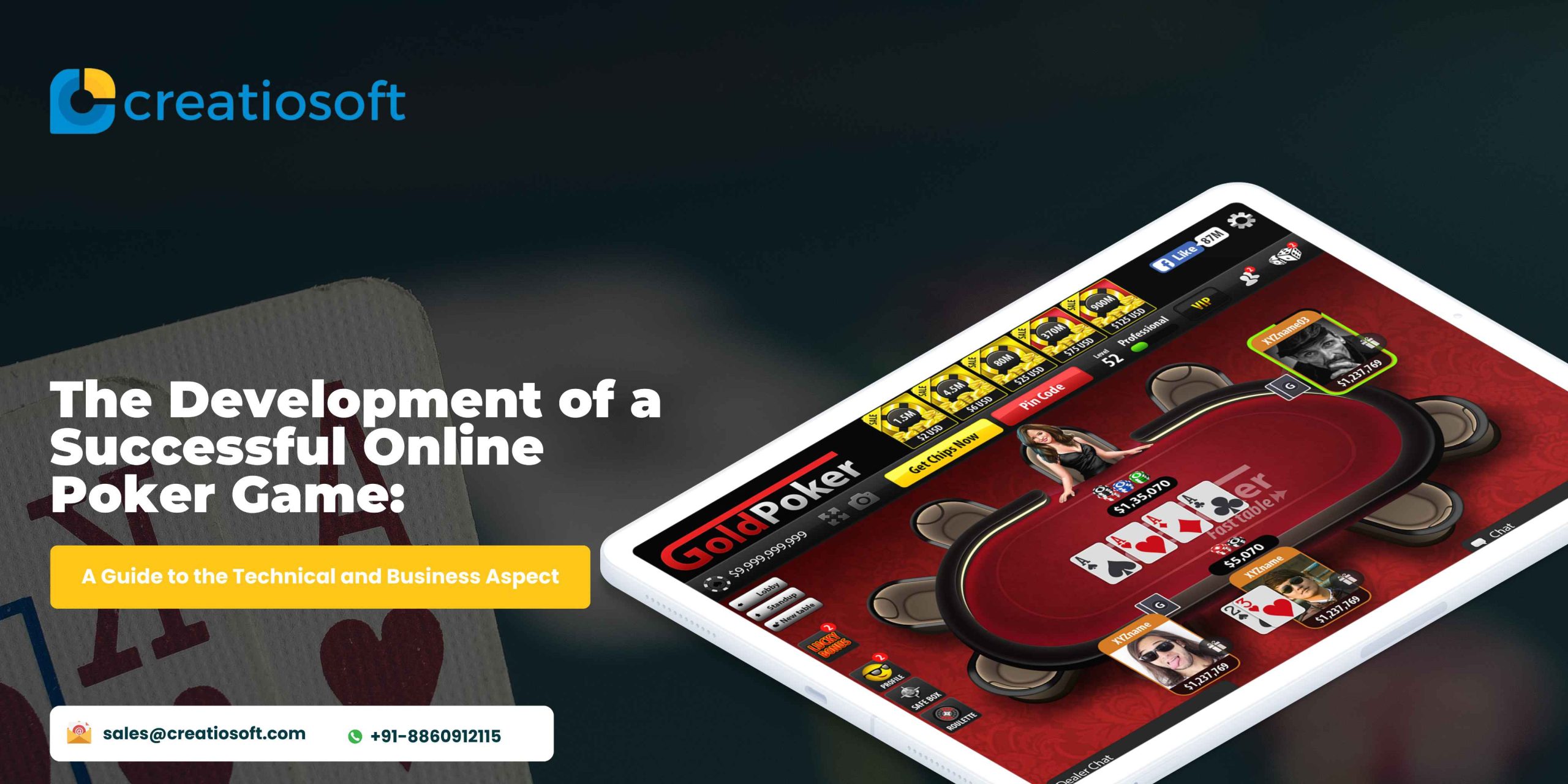Developing a successful online poker game involves both technical and business considerations. On the technical side, the game must be built with a robust, secure platform that can handle a large number of players and transactions. The game should also have a user-friendly interface and offer a variety of game types and betting options.
On the business side, it is important to have a clear monetization strategy, such as offering in-game purchases or taking a percentage of each pot. It is also essential to establish partnerships with payment processors and online marketing companies to help promote the game. Additionally, it is crucial to follow all relevant gambling laws and regulations in order to operate and build trust with players.
It is essential to have a solid understanding of both the technical and business aspects of online poker game development. This can be achieved by working with experienced developers and industry experts, as well as by conducting thorough market research and testing.

The development of a profitable online poker game necessitates a careful balance between technical and business factors. Today we are going to discuss the two major aspects of the development of an online poker game i.e. Technical and Business.
Let’s dive into the Technical aspects of online Poker game development:
Technical Aspects:
Technical aspects are important in the development of a successful online poker game because they ensure that the game runs smoothly and is free from glitches and errors. This is crucial for maintaining the integrity of the game and ensuring that players have a positive experience.
Some of the key technical aspects that are important in online poker game development include:
● Secure and reliable software:
Online poker game software should be secure and reliable to ensure the integrity of the game and protect player data. This includes using encryption and secure servers to prevent hacking and data breaches.
● Fair and random game mechanics:
The game mechanics should be fair and random to ensure a level playing field for all players. This includes using a random number generator to shuffle the deck and deal cards.
● Multi-platform compatibility:
The game should be compatible with a variety of platforms, such as desktop, mobile, and tablet devices, to ensure a seamless gaming experience for players.
● User-friendly interface:
The game interface should be easy to navigate and understand for players of all skill levels. This includes intuitive controls, clear instructions, and helpful tutorials.
● Integration with payment systems:
The game should be able to integrate with different payment systems to allow players to easily deposit and withdraw funds. This includes support for credit cards, e-wallets, and cryptocurrency.
● Real-time data tracking:
The game should track and record player data in real-time to provide valuable insights and analytics for the game developer. This includes player behaviour, game performance, and revenue generation.
● Live support and customer service:
The game should have a dedicated customer service team to provide support and assistance to players in real time. This includes live chat, email, and phone support.
● Regular updates and maintenance:
The game should be regularly updated and maintained to fix bugs, improve performance, and add new features. This includes regular security updates, gameplay tweaks, and new content releases.
● Server architecture:
Server architecture is a crucial aspect of building an online poker game. It handles communication and data storage for the game. It ensures a smooth and stable gaming experience for players.
● Game Variation and Innovation:
To keep players involved, it is critical to provide a range of games as well as to constantly innovate and improve the gameplay experience. This can include introducing new features, games, and tournaments, as well as varying stakes and buy-ins for players of all skill levels.
● Game Design and User Experience:
Design and user experience are very important in making a poker game that is engaging and easy to use. By having a good design, players will be more likely to stay engaged with the game. It also makes it easier for users to find their way around the game and understand how to play.
Factors to remember while designing the game are:
- For players of all skill levels, the game should be simple to learn and navigate.
- The game should have a simple and easy-to-use interface that allows players to quickly access various features and options.
- Players should be able to customize their gameplay experience by changing settings, avatars, and other aspects.
- Chat, leaderboards, and tournaments are examples of social elements that can help enhance player engagement and retention.
- The game should be optimized for touch controls and mobile screens.
- The game should protect players’ personal and financial information while also being fair to all participants.
- Players will find the game more engaging and immersive if animation and sound effects are used.
- Players should be able to modify the game’s tempo so that they can play at their own leisure.
Technical aspects of the game are not the only factor that leads to its success. To make a game successful and engaging, business aspects also need to be kept in mind.
Business Aspects:
To develop a successful online poker game, you need to have a thorough understanding of the business aspects of the industry. These include understanding the target market, competition, revenue streams, and marketing strategies.
A few Business strategies for online poker games are:
● Target Market:
Developers need to understand the target market to make a game that appeals to players and meets their needs and preferences. This includes understanding player demographics, such as age, gender, and location. Also, their skill level and preferences for different types of games and betting limits.
● Competition:
Finding the game’s unique selling qualities requires a thorough study of the competitors. It also differentiates it from other poker games on the market. To be successful in the poker industry, it is important to understand not only the features and gameplay of other poker games but also the revenue streams and marketing strategies of your competitors. This way, you can better identify opportunities and threats in the marketplace. By being aware of what others are doing, you can stay one step ahead and position yourself for success.
● Monetization:
The option to monetize a poker game is crucial to its success. It enables the game to produce income and becomes commercially sustainable.
There are several ways to monetize an online poker game, including:
- In-app game Purchases: The popular way to monetize an online poker game is through in-app game purchases. It includes buying virtual currency or items that can be used in the game.
- Subscription Models: Some online poker games offer a subscription model. In these models, users pay a monthly or yearly price to gain access to particular services or content.
- Real-Money Poker: Online poker games can also generate revenue by offering real-money poker games. By using this feature, players can bet and win real money.
- Tournaments and Leagues: Online poker tournaments are a great way to win prizes and cash. Many online poker games offer tournaments or leagues that players can take part in. By playing in these tournaments, players have the opportunity to win prizes or cash. So if you’re looking for a way to win some extra money, consider playing in an online poker tournament.
- Advertising: Advertising is one of the most popular ways to monetize an online poker game. We may put up banners or video commercials or provide sponsorships to companies who wish to be associated with the game.
● Marketing Strategy:
We must create a marketing plan that promotes the game and targets a suitable audience. This aids in increasing player acquisition and retention. This includes identifying the most effective channels for reaching the target market. Social media, online advertising, SEO, and affiliate marketing are a few of them. It also develops a strong brand and message that resonates with players.
Targeting both current and potential players is essential for a profitable marketing strategy for an online poker game.
Here are some of the marketing strategies:
- Creating a Buzz: To create a fanbase and create excitement about the game, one successful strategy is to use social media and online communities. It is possible to achieve this by producing interesting information, such as tutorials and strategy manuals. Holding online competitions and other events to generate excitement and compel players to share their experiences with others.
- Influencer Marketing: Partner with influential or well-known poker streamers who can promote the game to their audience.
- Running Paid Ads: Paid advertising on websites like Google, Facebook, and other portals can effectively reach a larger audience.
- Email marketing: In order to connect with potential players and keep current players interested, email marketing campaigns can also be utilized.
Apart from using these methods, it is essential to track and evaluate the effectiveness of various marketing channels and campaigns. All these techniques identify what works and what doesn’t. This makes data-driven decisions that will lead to long-term performance improvement.
● Legal and Regulatory Requirements:
Before you start playing online poker games, it’s important to understand the legal landscape. Different countries have different laws and regulations, so you need to make sure you’re compliant. Online poker, for instance, is permitted in some states but not all of the United States. Some have licensed and regulated the activity, while others have outlawed it.
Operators of online poker games must also abide by a number of legal obligations. Such as getting the necessary permits and certificates, maintaining the required level of technical skill, and putting in place safeguards against fraud and money laundering. They may also require players to disclose certain information. The information contains odds of winning and providing dispute resolution mechanisms.
● Analyzing and optimizing the game’s performance:
Metrics such as player retention, income, and lifetime value are critical for assuring an online poker game’s long-term profitability. These indicators aid in identifying areas for improvement and guiding decision-making. This boosts player acquisition and retention while increasing income.
- Player Retention: Player retention is an important metric that indicates how many players stick with the game over time. A high level of player retention implies that the game is interesting and meets the needs of the players. Low player retention means that certain aspects of the game, such as game balance, social features, or in-game incentives, may be absent.
- Revenue: Another key parameter that reflects the amount of money earned by the game is revenue. Advertising, in-game purchases, memberships, and real-money poker games can all generate cash. Measuring revenue can assist in determining the most successful monetization tactics as well as areas for development.
- Lifetime Value: Lifetime value (LTV) is a metric that calculates the overall revenue generated by a player over the duration of their tenure. LTV is significant since it assists in identifying the most valuable players. It helps in understanding which techniques are most efficient in promoting player acquisition and retention.
- DAU/MAU: Daily active users (DAU) and Monthly active users (MAU) are measures that evaluate how many players are actively involved with the game on a daily and monthly basis. This can assist in determining the most popular and engaging components of the game, as well as any changes in trends over time.
- Retention rate: The retention rate is the percentage of players who return to the game after their first session. This helps to evaluate how well the game engages players and keeps them coming back.
- Cohort analysis: Cohort analysis is a method of tracking the behaviour of a group of players over time. It aids in understanding the distinct groups of players, their behaviour, and trends. It also identifies patterns of behaviour that may improve the game.
Game creators can increase game performance and drive long-term success by monitoring and adjusting key indicators. This process includes determining opportunities for improvement, such as game balance or social features, as well as identifying the most successful monetization techniques, such as advertising or in-game purchases.
Conclusion:
As you can see, developing a successful online poker game necessitates a significant amount of technical and business knowledge. You may design a sturdy and successful game that will keep players coming back for more. To design the game, thorough research of the technology, assessing the competition, and considering the financial implications of the endeavour are important. With the right combination of creativity, knowledge, and skill, it is possible to create an online poker game that stands out from the competition and brings long-term success. So, why not dive into the world of online poker and experience the thrill of battling against gamers from all over the world?






